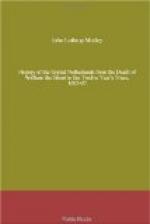It was thought high time for the bloodshed to cease in the provinces; and as England, by making a treaty of peace with Spain when Spain was at the last gasp, had come to the rescue of that power, it was logical that she should complete the friendly work by compelling the rebellious provinces to awake from their dream of independence. If the statesmen of Holland believed in the possibility of that independence, the statesmen of England knew better. If the turbulent little republic was not at last convinced that it had no right to create so much turmoil and inconvenience for its neighbours and for Christendom in general in order to maintain its existence, it should be taught its duty by the sovereigns of Spain and Britain.
It was observed, however, that the more greedily James listened day after day to the marriage propositions, the colder became the Spanish cabinet in regard to that point, the more disposed to postpone those nuptials “to God’s providence and future event.”
The high hopes founded on these secret stratagems were suddenly dashed to the earth before the end of the year; the explosion of the Gunpowder Plot blowing the castles in Spain into the air.
Of course the Spanish politicians vied with each other in expressions of horror and indignation at the Plot, and the wicked contrivers thereof, and suggested to Cornwallis that the King of France was probably at the bottom of it.
They declined to give up Owen and Baldwin, however, and meantime the negotiations for the marriage of the Prince of Wales and the Infanta, the million ducats of yearly pension for the needy James, and the reduction of the Dutch republic to its ancient slavery to Spain “under the eye and arm of Britain,” faded indefinitely away. Salisbury indeed was always too wise to believe in the possibility of the schemes with which James and some of his other counsellors had been so much infatuated.
It was almost dramatic that these plottings between James and the Catholic king against the life of the republic should have been signally and almost simultaneously avenged by the conspiracy of Guido Fawkes.
On the other hand, Rosny had imparted to the Dutch envoy the schemes of Henry and his ministers in regard to the same object, early in 1605. “Spain is more tired of the war,” said he to Aerssens, under seal of absolute secrecy, “than you are yourselves. She is now negotiating for a marriage between the Dauphin and the Infanta, and means to give her the United Provinces, as at present constituted, for a marriage portion. Villeroy and Sillery believe the plan feasible, but demand all the Netherlands together. As for me I shall have faith in it if they send their Infanta hither at once, or make a regular cession of the territory. Do you believe that my lords the States will agree to the proposition?”




